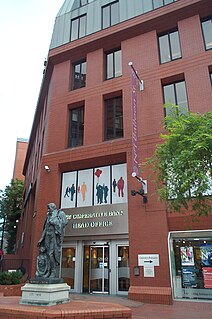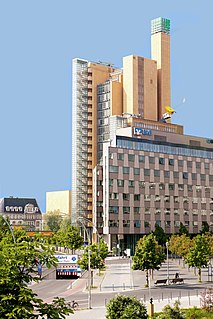
A cooperative is "an autonomous association of persons united voluntarily to meet their common economic, social and cultural needs and aspirations through a jointly owned and democratically-controlled enterprise". Cooperatives are democratically owned by their members, with each member having one vote in electing the board of directors. Cooperatives may include:

A housing cooperative, or housing co-op, is a legal entity, usually a cooperative or a corporation, which owns real estate, consisting of one or more residential buildings; it is one type of housing tenure. Housing cooperatives are a distinctive form of home ownership that have many characteristics that differ from other residential arrangements such as single family home ownership, condominiums and renting.

The Canadian Labour Congress, or CLC is a national trade union centre, the central labour body in Canada to which most Canadian labour unions are affiliated.

Father José María Arizmendiarrieta Madariaga was a Basque Catholic priest ideologue and promoter of the cooperative companies of the Mondragon Corporation, originally located in the Basque Country and currently spread throughout the world. The year 2021 is the second social economy business group in Spain, bringing together ninety-eight cooperatives, eight foundations, one mutual, ten coverage entities and seven international delegations, distributed in four areas: finance, industry, distribution and knowledge.
A worker cooperative is a cooperative owned and self-managed by its workers. This control may mean a firm where every worker-owner participates in decision-making in a democratic fashion, or it may refer to one in which management is elected by every worker-owner who each have one vote.
A social enterprise is an organisation that applies commercial strategies to maximize improvements in financial, social and environmental well-being. This may include maximizing social impact alongside profits for co-owners.
The social economy is formed by a rich diversity of enterprises and organisations, such as cooperatives, mutuals, associations, foundations, social enterprises and paritarian institutions, sharing common values and features:

Cooperative banking is retail and commercial banking organized on a cooperative basis. Cooperative banking institutions take deposits and lend money in most parts of the world.
The Financial Consumer Agency of Canada (FCAC) is an agency of the Government of Canada that enforces consumer protection legislation, regulations and industry commitments by federally regulated financial entities. It also provides programs and information to help consumers understand their rights and responsibilities when dealing with financial institutions and promotes financial literacy.

The Alliance of Concerned Teachers (ACT-Teachers) is a progressive and militant national democratic mass organization of teachers, academics, and other education workers in the Philippines, established on June 26, 1982. It is the largest non-traditional teachers' organization in the country, and campaigns for the economic and political rights of teachers and other education workers as well as on wider social and political issues.

Cooperative economics is a field of economics that incorporates cooperative studies and political economy toward the study and management of cooperatives.
The Spanish Association for Standardization and Certification (AENOR) is an entity dedicated to the development of standardization and certification in all Spanish industrial and service sectors.
The European Association of Co-operative Banks (EACB) is the leading trade association for the co-operative banking sector with 27 member institutions and co-operative banks located in 22 countries worldwide. As the representative of the world's largest cooperative banking cluster, the EACB promotes the interests co-operative banks, or banks that provide access to finance at the local level with a relatively small investment.

The National Association of German Cooperative Banks is the umbrella association for the cooperative banking sector in Germany. As of 2015 it had 1,021 members, which represents all the cooperative banks in Germany, including local cooperative banks, PSD banks, Sparda banks, Church banks and Cooperative financial institutions. The cooperative banking sector in Germany has a balance sheet of 1,081 billion euros and employs around 191,000 members of staff.

The Uganda Local Governments’ Association (ULGA) is the National Association of Local Governments of Uganda. It is a private, voluntary and non-profit body.
The Jamaica Civil Service Association is an association representing the civil servants of Jamaica.

The General State Administration is one of the Public Administrations of Spain. It is the only administration with powers throughout the national territory and it is controlled by the central government.
The Finnish Competition and Consumer Authority is the Competition regulator in Finland. It is the regulatory authority of Politics of Finland which works in the field of competition and consumer rights protection. The purpose of the Finnish Competition and Consumer Authority is to create healthy and effective markets in which companies and other operators act responsibly and in keeping with consumers' interests.

The Ambassador Permanent Representative of Spain to the United Nations is an official of the Government of Spain belonging to the diplomatic corps representing Spain before the United Nations (UN) based in New York City, United States. This permanent representation, unlike the Permanent Representation of Spain to the European Union, does not have its own legislation and is regulated by the general regulations governing diplomatic missions, by international law and by the internal law of the UN.










